- Home
- Chris Ryan
Land of Fire Page 5
Land of Fire Read online
Page 5
Guy came back and spoke to Andy. Had the mission been compromised or not?
"We have to abort now, damn it!" the pilot was shouting. "If the Argies reckon we're out here they'll scramble fighters to shoot us down."
Andy told Guy, "I reckon the pilot's shitting his pants at the thought of ditching in the sea."
This was true, but I didn't blame the crew for wanting a way out from what would be almost certain death. If we aborted now they probably had just enough fuel to fly to neutral Chile, land the helicopter and turn themselves in.
"We've come this far," Andy said. "I'm not bottling out without taking a crack at the mission."
The seconds were ticking by. We were eating into precious fuel. Guy was hesitating in two minds over whether to abort or continue. If he delayed much longer we wouldn't have any choice.
Exasperated, Andy pushed past him to the hatch and swung himself up on to the flight deck. "Listen, you gutless bastards," we heard him shout. "Get us back to the drop point. After that you can do what you like."
We listened anxiously to the radar operator, but the signal to the south had faded out. There were no more flares. It must have been a nervous sentry on the base.
Andy crouched by the navigator, plotting a course to the landing point. We planned to set down near an isolated estancia three kilometres to the west of the air base. It was only a couple of minutes away, so everyone started getting their gear together.
"OK, this is it," the pilot shouted into the headsets. "Touch down in one minute. I'll give you exactly thirty seconds to get your gear out before I lift off again."
CHAPTER SEVEN
It was 5.05am and still pitch dark as we settled in to land. The helicopter touched down in a cloud of dust. Taffy was first out, followed by Tom and then me. We spread out in a rapid circle around the aircraft, covering all the arcs, weapons at the ready. Taffy made a sweep with his night-vision goggles. "All clear," he announced. We were in the centre of a shallow bowl surrounded by steep hills. There appeared to be no trees, only tussock grass and some kind of prickly bush. There was a dusting of snow on the ground. After the aircraft it was bitterly cold. My nausea vanished as I filled my lungs with fresh air.
We began rapidly passing out the berg ens while the Sea King sat there, motors running and rotors spinning, ready to lift off at a moment's notice. It was vital to get the helicopter unloaded and safely away before its presence was detected.
"Get a fucking move on, can't you?" Doug hissed at me as I fumbled a pack.
"Up yours," I told him, heaving the 501b bergen on to Taffy. After the anxieties of the trip it was a relief to have our feet on the ground and be active. The mission was on schedule and we were confident we could pull it off. Our map would guide us to the edge of the airbase. We would set ourselves up an OP and be ready to play our part when D Squadron hit the place in two or three days' time.
We were just removing the last of our kit when a blaze of light filled the sky to the east of us, the direction of the airbase. Another flare. Instantly we froze, expecting shots from the darkness. Had we walked into a trap? Was it the signal for an attack?
The Sea King pilot didn't hesitate a second. He yanked on the collective lever and pulled maximum power. The helicopter rocketed up into the air with the navigator clinging on to the open hatch. Doug, who was nearest, was knocked ofF his feet by the rotor wash. He jumped up swearing. "Bloody gutless crabs!" Actually they were Navy aircrew but to Doug they were still fliers.
From the sound of the engines they were heading back westwards. They had decided to try to make for the Chilean border.
As officer, Guy had to make a quick decision. The helicopter was less than a mile away, still within radio range. Should he summon it back to evacuate us, aborting the mission? This was the last chance. Was he going to bug out for Chile or were we going to grit our teeth and stay? Not for the first time, I felt glad I wasn't an officer. Sometimes it calls for more courage to call a mission off than it does to stay.
Andy began arguing fiercely. "These are raw troops," he was saying, punching his fist into his palm. "Conscripts. They get jumpy at night and fire at shadows. They set off flares to chase away the dark, like frightened kids. They are no threat to us."
Guy was unhappy. "They picked us up on radar. They got a lock on for God's sake. They must be aware there was a helicopter out here. They've tracked it across the border on their screens, seen it land. They'll search until they find us."
I was not so sure of that. The SAS were trained in concealment. We could go to ground like crabs in a whore's bush.
"If they do take us it'll blow the main operation wide open," said Guy.
"Without us on the ground the assault would have to be aborted anyway," Andy answered back. "It would be suicide for them to go in blind. They know that."
We peered into the darkness with the night-vision goggles. After the blasting noise we had all been subjected to in the helicopter it seemed astonishingly quiet. I was aware of the wind and the rustle of the grass. It was bitterly cold too.
If we had been spotted the patrols would be already setting out; there was no time to hang about, it was stay or go.
As if determined to make up our minds for us, another flare arched up, much closer this time, bathing the sky in a lurid glow.
It was enough for Guy. "Doug, get on the radio. Contact the helicopter and have them return to pull us out." To Andy he said, "I'm sorry, it's no use. We have to abort."
Doug whipped out the VHP band 320 radio with its V-shaped aerial and started transmitting. According to the mission plan the helicopter was supposed to remain on station for fifteen minutes after dropping us off, ready to return for extraction or repositioning if we should need it. Doug tried two different frequencies before turning back to Guy.
"Can't raise them on the com ms
"Keep trying," Guy told him. "They may be shadowed by the hills." If the helicopter was hugging the ground to avoid radar it might well be out of radio reach.
"Bloody Argies," Taffy swore. "Bloody Navy. Fuck the lot of them. All this way for nothing."
All of us felt a bitter disappointment. The mission had failed before it had started. No one, though, questioned Guy's decision.
Doug flung the transmitter down. "Fuck all!"
"Try the satcom," Andy told him. "Send the abort code. Say we need extraction and we've lost contact with the helicopter."
"Maybe they'll change their minds and send in another Sea King to lift us out," suggested Tom as Doug snapped shut the 320 set and unfurled the satcom dish. This transmitter was more risky because the satellite communications system made a bigger splash-out, and its transmission was easier to detect, but it was imperative that we let Hereford know as soon as possible that the mission had aborted. The coded message was recorded and sent in a high-speed burst. It took just seconds for a transmission to be made once a connection had been established.
Doug dispatched the message and got a bald acknowledgement back. It would take Hereford a few hours to figure out an extraction. The probability was that we would have to leg it for the border. In the meantime we had to operate on the assumption that the Argies had heard the helicopter land and were searching for us. That meant finding a safe hiding place to lie up until nightfall.
"Right," Andy ordered. "Shoulder packs and move out. Hard routine." Hard routine meant no fires so no hot food, nothing to eat or drink in fact but a mouthful of water from our canteens and some chocolate to keep us going.
Andy and Guy studied the map. The shortest route to the border was due west, but the country was mountainous and cut by rivers. We would do better to take the longer route across the pampas to the north.
"It's about forty miles," Guy said. "If we follow the line of the main coast road, travelling by night it should take us four days, a week at the outside."
That didn't sound too bad. The road looked pretty straight on the map with only one village which we could bypass. Otherwise all we would hav
e to watch out for were a few isolated estancias.
We set off in single file, Taffy leading. It was his job to scout out the route ahead and see we didn't walk blindly into a trap. It was almost 5.30 and still dark, so we had to use the night-vision scope. It was imperative that we find an isolated spot to hole up in before daylight. The country was flat and bare with thick spiky grass and shrubby trees and bushes, mostly bent double by the wind. There was no sign of human habitation or animal life except for the occasional bird that flew up as we neared. I walked with my rifle cocked and cradled in my arms, head moving from side to side as I swept the ground ahead. This was my first major mission in enemy territory and I was anxious to acquit myself well.
We had been trudging for about an hour when we reached the highway. It was a gravel road, unfenced but flat and straight, running almost due north. By chance it seemed like a quiet road the lights of a heavy truck came grinding down towards us but we lay flat in the grass and it went past in a cloud of dust without seeing us. Then we jogged across while Andy stood guard and dived into cover on the far side.
We were in open country now, a succession of shallow ridges covered with heather and tundra-like grasses. There were traces of snow about, but not enough to leave a trail. We tabbed on for another thirty minutes till Andy found a shallow depression on a rise from which we could watch the road about a thousand metres away. It was sheltered from the wind and there were some scrappy bushes to give cover. He examined the land on every side with care through binoculars before giving it the OK.
"This'll do," he said finally, unslinging his pack. "It doesn't look like anyone comes here. Doug, you take the first watch with me. The rest of you into your bivvy bags. Snap to it."
He wanted us under cover while there was still some darkness remaining. I shed my pack and pulled out my light camo net. I knew exactly where it was stowed. I could find any item of kit blindfold at night. Using my field knife, I worked a rough scrape big enough to take my body. It took some doing; the vegetation was incredibly tough. I spread out the net and plaited it with grass. Swiftly I pegged it down around the scrape and wriggled underneath with my rifle.
I pulled my bergen in after, working myself further in under the netting until everything was out of sight. It had taken me less than a minute and I would be completely invisible from the air. The others had done the same. On a flat grass plain an entire section of men had vanished into the ground.
Hidden under the net, I extracted my bivvy bag, crawled inside and zipped it up. Now I was warm and sheltered from the cold and wet. I could lie here all day if necessary.
Dawn came, creeping slowly over the flat landscape, revealing saw-toothed mountains to the south-west. Soon the first alarm came a light plane passing overhead half a mile away to the south. It was flying low and we hoped it was a rancher's private aircraft. In this remote land, with few roads and some ranches extending over hundreds of thousands of acres, aircraft were essential vehicles. We watched it pass away in the direction of the border. The sun was over the horizon now, but obscured by dull cloud.
Moments later, Taffy reported vehicles approaching from the south-east at high speed.
"Firing positions!" Andy called. In seconds we were out of our hides, packs closed, our weapons cocked, crouching at the edge of the rise, ready to move out at the run.
The trucks drew level with our LUP and continued without pause, trailed by clouds of spiralling dust. We counted six four-tonners, ten to twelve men apiece, probably with a weapons platoon among them. Evidently the helicopter had been detected. Their job, if they didn't run down their quarry on the road, would be to set up a patrol line ahead of us. The main force would follow behind like beaters driving us on to the guns.
Most soldiers are unwilling to dismount from vehicles unless they have a positive sighting of the enemy. Our tactics would be to stay where we were and wait till nightfall. Then we would tab out and work our way around any roadblock. Only very experienced troops can handle night operations. What worried us was the aeroplane. The country we were in was featureless, a succession of shallow hills covered with long grass. It was easy to move across but it gave little cover. If we were to move an observer in an aircraft could spot us miles away, even at night.
Leaving Andy and Taffy on watch again, we crawled back inside our hides. After two hours Taffy would come back and one of us would take his place. Another two hours and it would be Andy's turn to rest. Before long it came on to sleet. The cold ate into my bones as I lay there unable to move. Through the holes in the camo netting I could periodically make out the plane in the distance. It was working back and forth along our track, flying north and south in long slow loops at an altitude of around 1000 feet. They were obviously searching for us and had guessed that we would be making for the border. I wasn't particularly worried at the thought escape and evasion was a major part of our training. There was nothing we didn't know about hiding up or slipping past cordons. Come nightfall, I was confident, we would find a way through. The majority of Argy troops were barely trained conscripts; they'd be no match for our skills.
It seemed like an age before the sound of the plane's engine finally faded away to the west. Even then we didn't move Andy wasn't taking any chances. The plane was still around and we were better off staying where we were for the present. It is the hardest thing in the world to lie still and wait. We could do it though; we could wait all day if necessary.
The sleet fell, but still we lay in our grass hides. My thoughts wandered about in a vain attempt to keep my mind off the cold and damp. Other fellows I know count to a million. Some claim to run blue movies in their heads. The day seemed endless, but Andy knew we were better off lying up like this than running around in the open.
It was late afternoon, and the winter sun was below the horizon when I heard Andy's voice calling us. I was so stiff my body could hardly move; every muscle in my limbs ached. I ripped off my canopy and struggled out, pulled on my pack and slung my rifle, ready for action. Without a word we formed up in open order and started moving again, as if nothing had happened.
Doug got the satcom set out and we made contact with Hereford again. This time there was a response: the abort was confirmed. There were no recriminations; they would come later at the debriefing. We were to tab out northwards as planned. The agent would rendezvous with us in a day or two at a spot to be arranged and lead us to an unguarded crossing. Nothing was said about a helicopter extraction.
We ate a bar of chocolate each and drank a little water, then Andy led us back down to the highway.
CHAPTER EIGHT
We were chilled, stiff and hungry, but it was a great relief to be out and moving about after the endless hours lying still. We marched rapidly, revelling in the open air. The wind was biting but the sleeting rain had eased off. Our boots crunched on the frosted ground. We walked like automatons, leaning forward to balance the weight of our packs, eyes constantly checking the sector that was ours to watch, covering each other's arcs. The secret of survival is to see the enemy before he sees you.
We walked parallel with the road, about twenty metres out. It gave us a useful navigational aid and we would have plenty of warning from the headlights of vehicles approaching. Andy was leading this time; he had the night-vision scope and the GPMG carried on a sling around his neck. We were ready to react to any threat. All it would take was one shout: "Contact!"
As the night wore on we grew more confident. We were covering ground at a steady pace of between two and three kilometres per hour. Our only problem was with the compasses they were designed for use in the northern hemisphere and were prone to erratic readings this far south. We had to keep stopping to identify features, which wasn't easy in an essentially flat landscape, but night travel was something we had practised a lot and were good at. In this country with few obstacles it was relatively easy. Occasionally we struck patches of bog and marsh, but in general it was all good firm grass.
The downside was the weather, which w
as deteriorating again. Before very long it was sleeting a blizzard, an unremitting blast of freezing cold that must have come straight from the Antarctic ice cap. It sliced through our wet clothes. There -was nothing to do but clear it out of your mind and carry on. I tried to empty my head of everything except putting the next foot on the ground in front of me. The Japanese have a saying, "Step by step, walk the thousand-mile road." I practised repeating it to myself over and over, slipping into a hypnotic rhythm as we tramped on and on across the pampas.
The sleet stung my eyes and my rifle weighed like lead in my arms. Of course Andy was carrying the gun, and I kept telling myself it was worse for him. The GPMG weighs over thirty pounds, three times the weight of my rifle. Andy always was a tough bastard, but I wasn't going to let myself be beaten by him. If he could keep going without complaining, so could I. I thought about the girl on the ship again. The image of her naked under interrogation was burned into my mind. Then I reran the helicopter crash in the sea, replaying it in my head like an endless loop. The sensation of drowning, the moment I felt Nick's hand release my trapped foot.
Whenever truck lights showed up in the distance we flung ourselves flat until the headlight beams had passed. Vehicles were scarce, though; most drivers had the sense to keep off the road in the hours of darkness in winter.
Andy set a good pace. When his eyes tired he handed over scout position to another of us. We changed over every thirty minutes or so any longer and our eyes became exhausted staring through the scope. There's no depth perception in the green-tinted field of view, which makes it hard to judge distance.
For hour after hour we stumbled along, bent double under the load of our huge berg ens picking our way by the dim shape of the man in front. Several times we encountered bridges but they were unguarded and we crossed them on the road, keeping in the tracks of vehicles to disguise our own. Occasionally we saw the lights of homesteads in the distance, but they were well back from the road and caused us no anxiety.

 Global Strike
Global Strike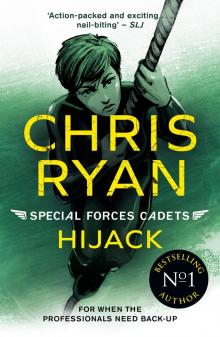 Hijack
Hijack Special Forces Cadets 2
Special Forces Cadets 2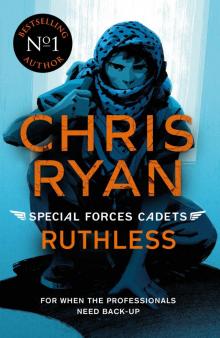 Ruthless
Ruthless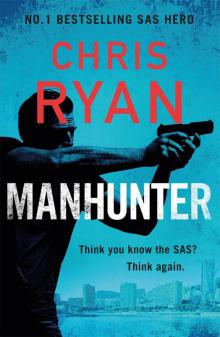 Manhunter
Manhunter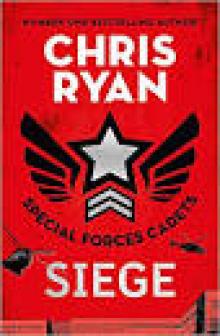 Special Forces Cadets 1
Special Forces Cadets 1 Red Strike
Red Strike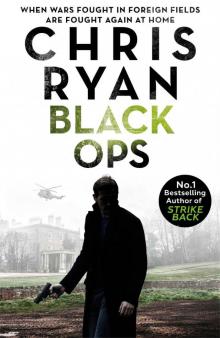 Black Ops
Black Ops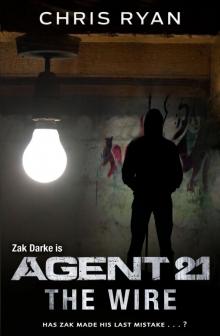 Agent 21: The Wire
Agent 21: The Wire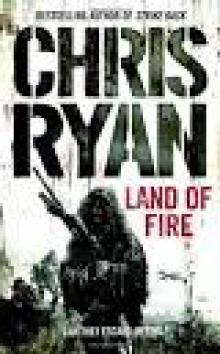 Land of Fire
Land of Fire Alpha Force: Fault Line
Alpha Force: Fault Line Under Cover (Agent 21)
Under Cover (Agent 21)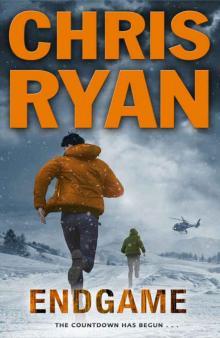 Endgame (Agent 21)
Endgame (Agent 21) Red Centre
Red Centre Blackout
Blackout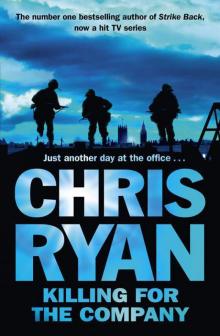 Killing for the Company
Killing for the Company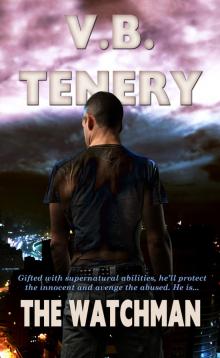 The Watchman
The Watchman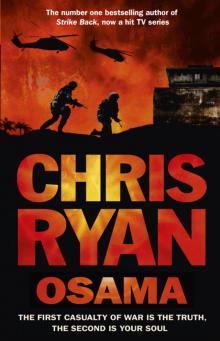 Osama
Osama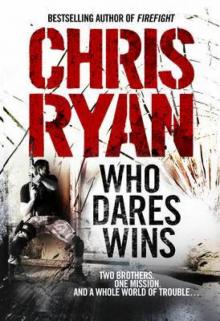 Who Dares Wins
Who Dares Wins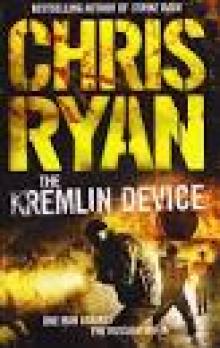 The Kremlin Device
The Kremlin Device Hunter Killer
Hunter Killer Alpha Force: Untouchable
Alpha Force: Untouchable Stand By Stand By
Stand By Stand By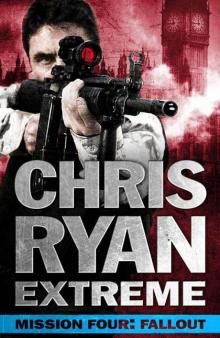 Chris Ryan Extreme: Hard Target: Mission Four: Fallout
Chris Ryan Extreme: Hard Target: Mission Four: Fallout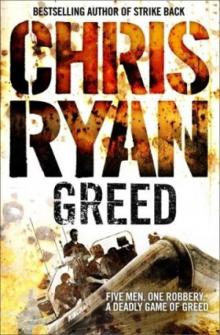 Greed mb-1
Greed mb-1 Alpha Force: Desert Pursuit
Alpha Force: Desert Pursuit Strike Back
Strike Back Greed
Greed The Bay Bulls Standoff
The Bay Bulls Standoff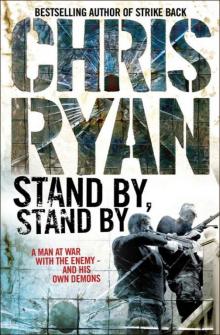 Stand By, Stand By gs-1
Stand By, Stand By gs-1 Outbreak
Outbreak Hunted
Hunted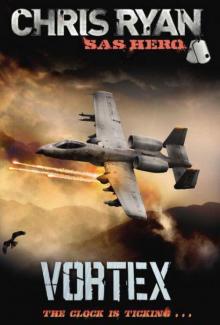 Vortex cr-4
Vortex cr-4 Rat-Catcher
Rat-Catcher Vortex
Vortex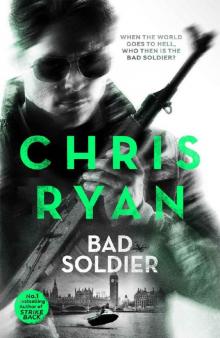 Bad Soldier
Bad Soldier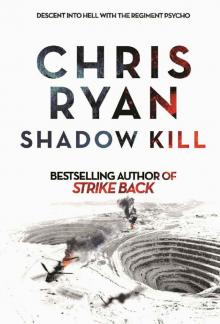 Shadow Kill: A Strikeback Novel
Shadow Kill: A Strikeback Novel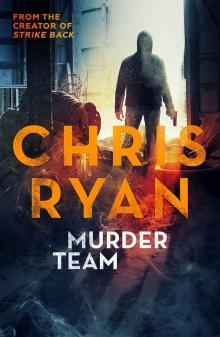 Murder Team (Kindle Single)
Murder Team (Kindle Single) One Good Turn
One Good Turn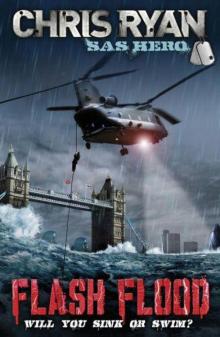 Flash Flood cr-1
Flash Flood cr-1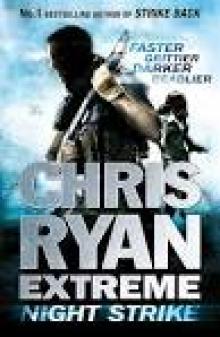 Night Strike
Night Strike Wildfire
Wildfire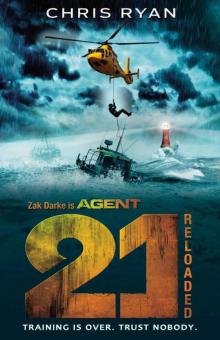 Agent 21: Reloaded: Book 2
Agent 21: Reloaded: Book 2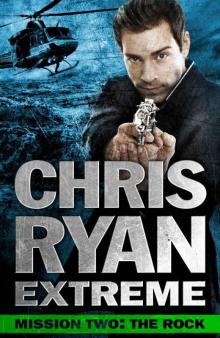 Chris Ryan Extreme: Hard Target: Mission Two: The Rock
Chris Ryan Extreme: Hard Target: Mission Two: The Rock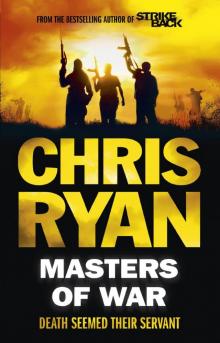 Masters of War
Masters of War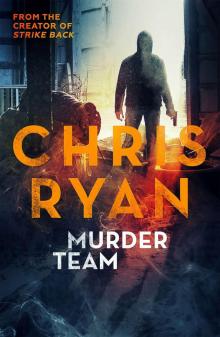 Murder Team
Murder Team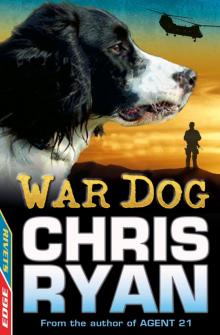 War Dog
War Dog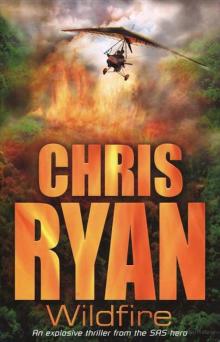 Wildfire cr-2
Wildfire cr-2 Survival
Survival The One That Got Away - Junior edition
The One That Got Away - Junior edition The Hit List
The Hit List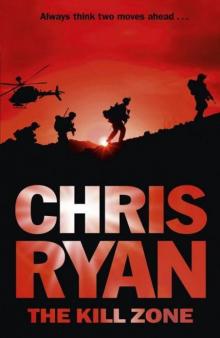 The Kill Zone
The Kill Zone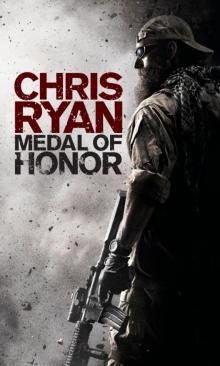 Medal of Honor
Medal of Honor Battleground
Battleground Twister
Twister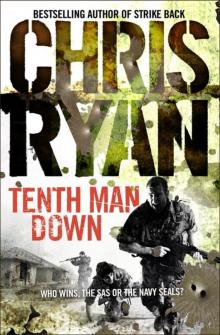 Tenth Man Down gs-4
Tenth Man Down gs-4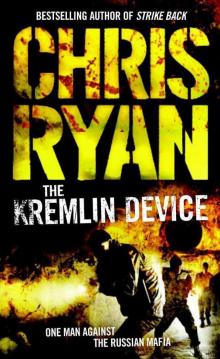 The Kremlin Device gs-3
The Kremlin Device gs-3 Hostage
Hostage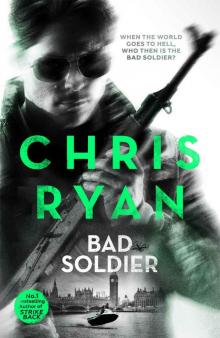 Bad Soldier: Danny Black Thriller 4
Bad Soldier: Danny Black Thriller 4 Alpha Force: Blood Money
Alpha Force: Blood Money Firefight
Firefight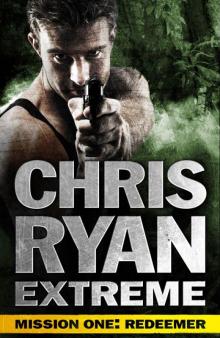 Chris Ryan Extreme: Hard Target: Mission One: Redeemer
Chris Ryan Extreme: Hard Target: Mission One: Redeemer Hit List
Hit List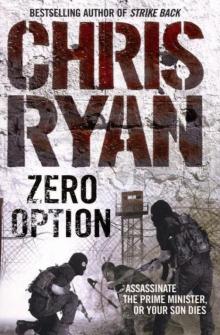 Zero Option gs-2
Zero Option gs-2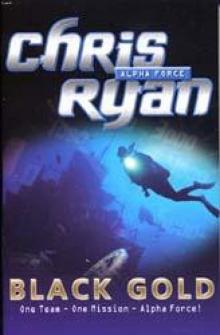 Black Gold
Black Gold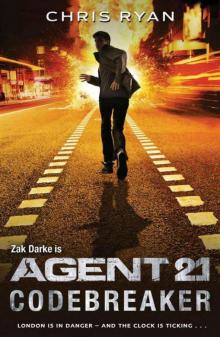 Agent 21: Codebreaker: Book 3
Agent 21: Codebreaker: Book 3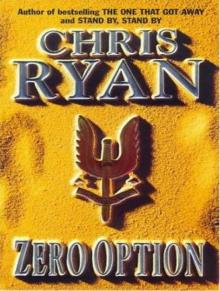 Zero Option
Zero Option Ultimate Weapon
Ultimate Weapon Tenth Man Down
Tenth Man Down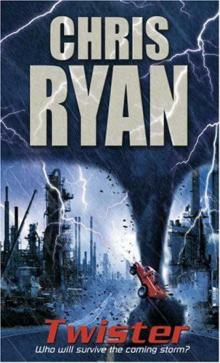 Twister cr-5
Twister cr-5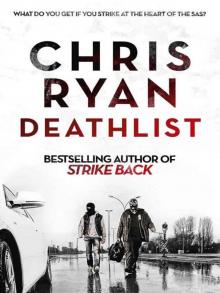 Deathlist
Deathlist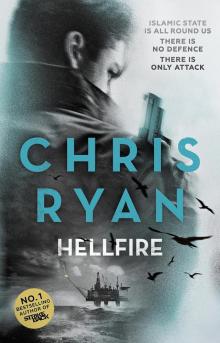 Hellfire
Hellfire Flash Flood
Flash Flood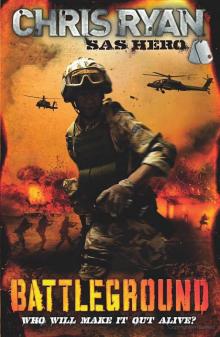 Battleground cr-6
Battleground cr-6 The Increment
The Increment